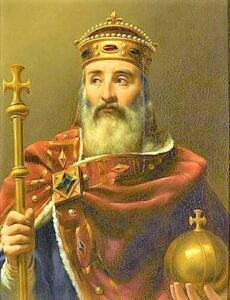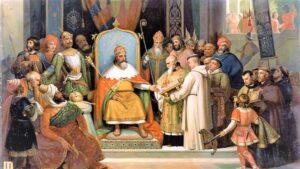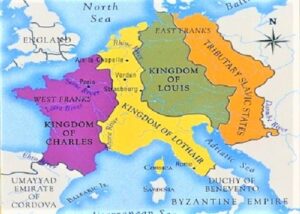Charlemagne (2 April 748 – 28 January 814) is also known as Charles the Great or Charles I, was king of the Franks from 768, the king of the Lombards from 774, Emperor of the Carolingian dynasty, and the Emperor of the Romans from 800 until his death.
During his reign, he conquered Italy and was crowned Emperor Augustus by Pope Leo III on December 25, 800, with some historians seeing this as an attempt to revive the Western Roman Empire. The Carolingian Empire was in Europe, in a sense, a rival state to the Eastern Roman Empire, with its capital at Constantinople (also called the Byzantine Empire ).
Charlemagne is part of the Carolingian dynasty and is sometimes considered the founding father of both France and Germany. Some historians consider him the father of Europe. He was the first ruler of an empire in Western Europe since the collapse of the Roman Empire with its capital in Rome.

Quick Facts Of Charlemagne
- Born: 2, April, 748, in the Frankish Kingdom
- Also known as: Charles the Great or Charles I
- Spouses: Desiderata (m. c. 770; annulled 771), Hildegard of Vinzgouw (m. 771; d. 783), Fastrada (m. c. 783; d. 794), and Luitgard (m. c. 794; d. 800)
- Dynasty: Carolingian
- Father: Pepin the Short
- Mother: Bertrada of Laon
- Religion: Roman Catholicism
- Died: 28 January 814 (aged 65, 66, or 71), Aachen, Francia
- Burial: Aachen Cathedral
- Quotes: Right action is better than knowledge; but in order to do what is right, we must know what is right. – Charlemagne
Rise of the Empire
The monarchy of Charlemagne at the end of his reign covered an area of over one million square kilometers. At its peak, Charlemagne’s empire encompassed the territories of today’s states:
- France
- Belgium
- The Netherlands
- Austria
- Switzerland
- West Germany
- Northern Italy
- And the Northeast of Spain and the Balearic Islands.
Administering such a huge country was difficult. The division into lands and counties, which was still functioning under the Merovingians, was maintained, but next to it counties were introduced as smaller units of territorial administration, which were subordinated to officials appointed and dismissed by the ruler.
In the borderlands of the monarchy, marches were organized, led by margraves with broad military powers. These marches (Danish, Friulska, Spanish, Breton, Pannonian) were a military barrier blocking pagan peoples and Muslims from entering the lands of the Carolingian state.
His military successes made Charles the most powerful ruler of Western Europe. The empire he built, inhabited by the Romanesque and Germanic people, economically and socially diverse, was in practice a patchwork of many conquered tribes and lands in which neither the sense of separateness nor the longing for independence died out.
Conscious of this, the ruler tried to unify the empire by introducing, inter alia, uniform Frankish law, a new administrative division, or a reformed monetary system based on the silver denar. The most lasting foundation of unity, however, was the strong power of the monarch and the community of Christian faith and culture.
King of the Franks

With the death of his father, Pepin the Short, Charlemagne became, in 768, king of the Franks, governing together with his brother Carloman I, whose early death in 771, ended the existing rivalry between the brothers.
During his long reign, Charlemagne fought against all who might threaten him. His well-organized forces, his military strength guaranteed him the domination of most of Europe. In 772, the defensive operation against the Saxons turned into a prolonged and bloody war that only ended with the total submission of that people, in 804.
In 774, the Lombard king Desiderio demanded that Pope Adrian I crown one of his sons as heir to the Frankish throne. The pope did not agree and had his territories invaded.
Charlemagne gathers his army and goes to the aid of the Pope defeating the Lombards in Pavia. After that triumph, he was crowned king of the conquered territory. Married to Desiderata, daughter of the Lombard king, he receives pressure from the pope and leaves his wife.
After the territories donated by his father were confirmed to the Church, Carlos Mago grants to the pope, Tuscany, Corsica, and the duchies of Spoleto, Benevento, and Venice, a region known as “Heritage of São Pedro”. For himself, he reserved the effective power, made himself proclaimed “Carlos, by Grace of God, King of the Franks, Lombardo’s and Patrício of the Romans.”
Charlemagne was less fortunate in his expansion to the south in 778 when he was defeated in the siege of Zaragoza, a region occupied by Muslims. Seven years later, he returned to Spain and conquered the region of Catalonia, which allowed him to create the Hispanic Mark, a border territory between the Muslim and Frankish domains.
Empire Of The Carolingian

The expansion of the Frankish state, which managed to bring together almost all of Christian and Western Europe, led Charlemagne to conceive the idea of becoming emperor. In 777 Charlemagne began the construction of his palace in Aachen – which the French called Aix-la Chapelle and the Germans, Aachen, in the current territory of Germany.
There he built a chapel and a school, the “Academia Palatina”. In 800, the Frankish kingdom reached the maximum expansion limits. During a Christmas Mass, Pope Leo XIII crowned Charlemagne Emperor of the West and absolute lord of the New Holy Roman Empire.
Charlemagne’s coronation brought the legitimacy of his rule over Rome and the rapprochement between the Frankish kingdom and the papacy.
Although he was illiterate until adulthood, when he learned to read and write in Latin, Charlemagne believed in the value of education and had notable scholars of the time come to his school to teach the officers and paladins- knights chosen by the bravery demonstrated on the battlefield.
The creation of the empire was legitimized, above all, by Charlemagne’s efforts to raise the cultural level of its so heterogeneous domains and to provide them with an effective economic, administrative and judicial structure.
Schools were installed in several other centers of the Empire, mostly founded by monasteries and bishoprics, where grammar, rhetoric, geometry, arithmetic, Latin, astronomy, music, and other subjects were taught. In the arts in general, architecture stood out. This period of flourishing arts and culture became known as the “Carolingian Renaissance”.
The Conflict with Byzantium
Nikephoros I, Byzantine emperor (“Basileus“) since 802, perceived Charles’ Imperial dignity as presumption and refused his recognition. A Frankish legation arriving in Constantinople in 803 had to return empty-handed.
The conflict intensified when Charles treated the regions of Dalmatia and Venice, claimed by Byzantium, as belonging to his reach. Nikephoros then sent the Eastern Roman fleet in 806 and launched a naval blockade against Venice. Charles’s son Pippin, King of Italy, however, was able to conquer Venice, apparently making Nikephoros more willing to negotiate.
A Byzantine legation arriving in Italy at the end of 810, which had actually intended to reach King Pippin (8, July, 810), who had died in the meantime, was summoned by Charles to Aachen and returned in 811 with a friendly letter, but uncompromisingly in response to the imperial question.
On their return, however, the Byzantine Emperor Nikephoros I had fallen during a campaign against the Bulgars in the Battle of the Warbiza Pass (July 26, 811). His son-in-law Michael I Rhangabe shortly afterward the power took over. Unlike his predecessor, he was interested in a lasting agreement with the west.
That is why Emperor Michael I now sent a Byzantine legation for his part to Aachen, arriving there in 812. In a public ceremony, this Charlemagne paid tribute and called him “Emperor”. Charlemagne’s emperorship was thus recognized diplomatically by the Byzantine Empire. Charles had to renounce Venice and Dalmatia again in the peace of Aachen.
In addition, the Byzantine emperors saw themselves as supreme, and to make this clear, the successors of Michael I added to their title emperor the genitive of the Romans (Byzantine Empire). This would document their unique rank as the unique successor of the Roman emperor.
Charlemagne’s following Western emperors, on the other hand, initially only called themselves imperator Augustus (exalted emperor). The title of the exalted emperor of the Romans (Romanorum imperator august) does not first appear in the west, that is in the Holy Roman Empire, until the time of Otto III in 996.
Charlemagne Death
His son Pepin of Italy died in 810 and the younger Charles in 811. In 813, he had a series of provisions concerning the organization of the Empire taken by five provincial synods (for more details, see Council of Tours, Council of Mainz, Councils of Arles, Council of Chalon).
They were ratified the same year by a general assembly convened in Aix-la-Chapelle, during which he took the precaution of placing the imperial crown himself on the head of Louis, the sole survivor of his sons.
Charlemagne died on 28 January 814, in Aix-la-Chapelle, from an acute illness that appears to have been acute pneumonia. According to Einhard, Charlemagne having left no indication concerning his funeral, after simple funeral ceremonies in the cathedral of Aix-la-Chapelle.
Charlemagne Quotes
- Nothing of that which was gained by fraud can go to the liberation of his soul. Let his wealth be divided among the workmen of this our building, and the poorer servants of our palace. – Charlemagne
- It is not a lack of self-restraint but cares for others that makes me dine in Lent before the hour of the evening. – Charlemagne
- Fathers and guardians, bishops of our Church, you ought to minister to the poor, or rather to Christ in them, and not to seek after vanities. But now you act quite contrary to this and are vainglorious and avaricious beyond all other men. – Charlemagne
- Right action is better than knowledge; but in order to do what is right, we must know what is right. – Charlemagne
- Take care that none of them escapes. – Charlemagne
- Let my armies be the rocks, and the trees, and the birds in the sky. – Charlemagne